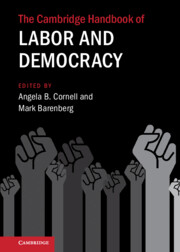Book contents
- The Cambridge Handbook of Labor and Democracy
- The Cambridge Handbook of Labor and Democracy
- Copyright page
- Contents
- Contributors
- Acknowledgments
- Introduction
- Part I Labor and Democracy: Theory and Practice
- Part II History, Politics, and Law
- Part III Labor, Diversity, and Democracy
- Part IV Country and Regional Perspectives
- 14 Labor, Workers’ Rights, and Democracy in Latin America
- 15 African Perspectives on Labor Rights as Enhancers of Democratic Governance
- 16 Why (Which) Workers Often Oppose (Which) Democracy?
- 17 Reclaiming Democracy
- 18 A Critical Assessment of Democratic Labor Unionism in South Korea from a Feminist Standpoint
- Part V Labor and Democracy Sectoral Case Studies: Platform Workers, Higher Education, and the Care Industry
- Index
- References
18 - A Critical Assessment of Democratic Labor Unionism in South Korea from a Feminist Standpoint
from Part IV - Country and Regional Perspectives
Published online by Cambridge University Press: 25 January 2022
- The Cambridge Handbook of Labor and Democracy
- The Cambridge Handbook of Labor and Democracy
- Copyright page
- Contents
- Contributors
- Acknowledgments
- Introduction
- Part I Labor and Democracy: Theory and Practice
- Part II History, Politics, and Law
- Part III Labor, Diversity, and Democracy
- Part IV Country and Regional Perspectives
- 14 Labor, Workers’ Rights, and Democracy in Latin America
- 15 African Perspectives on Labor Rights as Enhancers of Democratic Governance
- 16 Why (Which) Workers Often Oppose (Which) Democracy?
- 17 Reclaiming Democracy
- 18 A Critical Assessment of Democratic Labor Unionism in South Korea from a Feminist Standpoint
- Part V Labor and Democracy Sectoral Case Studies: Platform Workers, Higher Education, and the Care Industry
- Index
- References
Summary
Through the Candlelight movement, which led to the resignation of the former President due to corruption, a younger generation – which is the main victim of the neoliberal restructuring in South Korea – has raised fundamental questions concerning the definition of the “democracy” of the labor unionism. This paper argues that the “democratic norm” in Korean labor unionism should be assessed critically in terms of both the meaning and possibility of “collectiveness,” “militant organizational culture,” and the scope of “democratic value.” This chapter further maintains that these current critical questions on the (dis)continuity and sustainability of the democratic labor unionism correspond with feminist ideology, along with the growing diversity in the labor market in South Korea.
- Type
- Chapter
- Information
- The Cambridge Handbook of Labor and Democracy , pp. 293 - 304Publisher: Cambridge University PressPrint publication year: 2022

